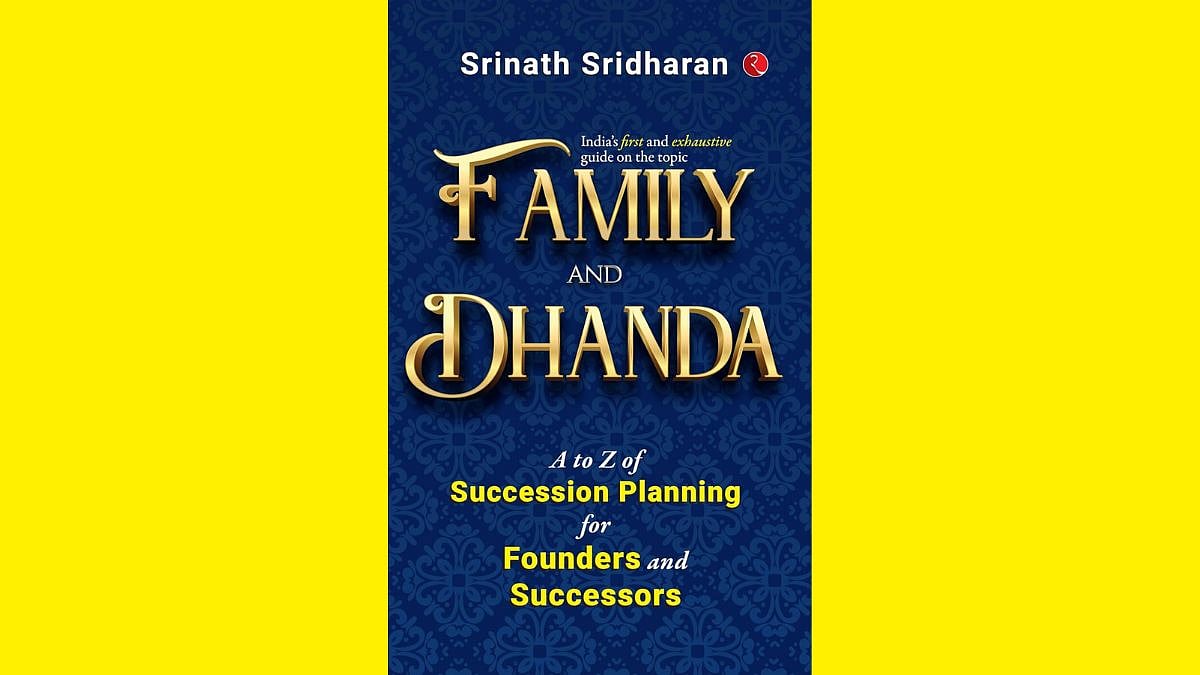One has seen it time and again that lack of succession planning by the founders or ruling heirs has ruined the businesses.
Family and Dhanda: A to Z of Succession Planning for Founders and Successors by Dr. Srinath Sridharan deals with this issue in detail. Like Harish Mariwala says in his recommendation, “This topic was waiting to be written.” (sic)
Dr. Sridharan is very candid and clear about his approach in the Preface. ‘My aim is to present complex topics in a simple and accessible manner, using jargon only when necessary. At times, this book may be provocative and uncomfortable, but that is not its primary intent.’ (sic)

The book starts with his Open Letter To The Head Of The Business Family, where he points out various problems that might occur in the future if they don’t have a succession plan in place and/or a vision for future. He urges the family heads to introspect on quite a few issues and offers this as a book to help them do that.
The book is divided into six parts that discuss not succession plans, but skill sets required for not just heads of the family, but successors and other members of the family who plan to contribute to the business in varied ways. It explores fundamentals of succession plans, challenges that family businesses face (all levels of businesses from small town shops to huge empires), complex interplay of family politics and more. It also discusses strategies that can be used to overcome certain challenging situations and to navigate family politics. As mentioned in the Introduction, ‘a significant part of the book is dedicated to practical strategies…’ (sic)
One thing he reasserts through out the book is that succession planning should be a proactive process done as an investment in the company keeping its future prosperity in mind.

“See, the biggest difference between pre liberalization, Indian business families and post is there is no asymmetry of information available and there is also access to private capital available for entrepreneurship,” Dr. Sridharan shares while talking about the need of succession plan and the need of the book written by him. “Of after post liberalisation, there is a very unique aspect which my book speaks about, but I wish we had more literature on that. We used to use the word called promoter to basically mean the family or the individual who started the business, who held equity capital. That was before the license Raj and the liberalization. It was seen only very few at that authority and power, but post that a lot of unlocking of wealth also happened in the capital markets. Generations of large businesses or even small businesses, even in smaller town, have gone out. Their kids are educated abroad, they have a global experience and exposure. So, so much of asymmetry and arbitrages have disappeared completely.”
In the first part, Importance of Succession Planning, Dr. Sridharan categorically mentions that the CEO position of a company cannot be bequeathed in a legal will. According to him, ability and competence should be the primary qualities considered while deciding the successor. “Which means that whether I come from a very pedigreed surname, yes, it does matter in some bits and parts of life. We’ve seen successes and failures of even the large businesses, so the surname doesn’t necessarily guarantee success,” states Dr. Sridharan. “You have to develop the leadership. You cannot assume it’s DNA.”
In the section A to Z of Succession Planning, one can see detailed explanations of varied concepts like Leadership, Inclusivity, Quality, Governance and their importance in family businesses on a day-to-day basis and while planning succession. Dr. Sridharan discusses the diverse skill sets required for successors in the part A to Z of Skill Sets of Successors.

What intrigues is the forthright way the author talks about spoilt brats in family businesses and family politics that can bring down the business houses. He points out that jealousy and other emotions can be detrimental to the business. “This book also speaks about marriage is going wrong today, but everything so typically we love our metaphors, where we brush everything under the carpet. This book was to demystify that in the social media led world you can’t hide things. So, it does hurt governance because if you’re a listed entity, what happens in your marriage is equally important to the other stakeholders. And family politics here includes kitchen politics and bedroom politics.”
The part Smoothing the Rough Edges starts with the chapter Say No To Jugaad. Dr. Sridharan reiterates that short cuts never help in the long run for any aspect of the business.
Questions at the end of the most chapters and an entire chapter A to Z Questions for The Family Council make this book reader friendly and a guide book that can be treated as a bible by business houses. “The questions are to provoke them to think, provoke them to start thinking,” concludes Dr. Sridharan.
